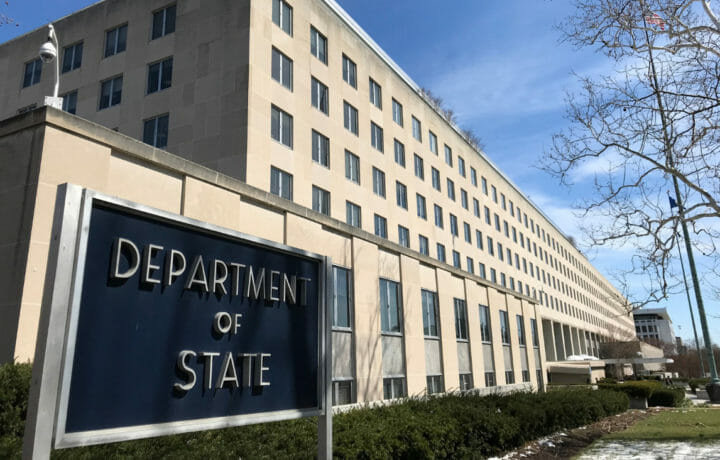A little known case involving the retention of national defense information is that of Geneva Jones. Jones, a State Department employee who purloined information from her employer, the Department, and provided it to Dominic Ntube, a West African journalist. On this date, August 31, 1993, she was indicted on 21 counts, which included espionage.
Following the Trail of Classified Documents
State Department cables began showing up in West African magazines over the course of several months in 1992-1993. In addition, in late 1992, several classified U.S. documents were found within a Liberian Command Post of Charles Taylor. These documents carried cover sheets indicating they had been received via a facsimile machine. The cover sheets contained the telephone number of the originator, that of Ntube. The phone number pointed to Washington D.C.
At that time, Charles Taylor’s organization, the National Patriotic Front of Liberia, was involved in a domestic civil war within Liberia. Taylor, often characterized as a warlord, was involved in conflict throughout western Africa, supported by Libya and others. In 1997, he prevailed and became the 22nd President of Liberia (1997-2003). In 2003, a second civil war within Liberia removed Taylor from power.
The discovery of these State Department cables in the magazines were brought to the attention of the U.S. government, which kicked off an investigation.
The investigation included the wiretap of Charles Taylor’s phone line (whether this was a true wiretap or the obfuscation of SIGINT collection the record does not detail). This wiretap revealed that Ntube faxed 14 documents to the Liberian rebels.
Ntube was then placed under investigation by both the FBI and the Diplomatic Security Service. The investigation showed the friendship between Ntube and Jones. During the 30-day period which Jones was under surveillance, the FBI testified that they saw her on 16 separate occasions take documents from her State Department office and carry them in grocery sacks or hidden within newspapers, which included more than 130 classified documents to Ntube.
On August 3, 1993, Jones was arrested. During the FBI interview, post-arrest, Jones revealed she had been providing Ntube classified materials for the past 18 months. She had provided Ntube, thousands of classified documents.
On August 4, 1993, Ntube was arrested. When the FBI searched Ntube’s apartment, they discovered 39 CIA documents marked Secret and over 6,000 classified State Department cables (not further identified).
The Plea
Jones was originally charged with 21 counts surrounding the theft of U.S. government items (documents) and two counts relating to the unauthorized communications of national defense information. In June 16, 1994, a plea bargain was arranged. She pled guilty to four charges, two counts each relating to espionage, gathering or transmitting defense information (U.S. Code 18:793), and two counts of theft of U.S. property (18:641).
On September 12, 1994, Jones was sentenced to 37 months in prison on each of the four counts which ran concurrently. The presiding U.S. District Judge Harold H. Greene said at that time, “Somebody would have to be a complete moron not to know that when you work for the State Department you can’t take documents out and give them to anybody.”
Ntube, according to the Washington Post, “was the publisher of the U.S.-based newspaper the Continent and operated the African Cultural Organization and the African-D.C. Hotline out of his apartment in the 1400 block of Columbia Road NW.” Prosecutors of Ntube dismissed his claim of being an active journalist, citing the magazine Continent had been dormant for more than a year.
The prosecution of Ntube would stretch out over a number of years, culminating in his entering a plea of guilty to much reduced charges, in essence a misdemeanor. The agreed upon text, “On or about 7/25/93, in the District of Columbia and elsewhere, the defendant, DOMINIC NTUBE, did knowingly and willfully receive, with the intent to convert to his own use, property of the United States, that is, classified documents of the United States, the value of which was less than one hundred dollars, with knowledge that said documents had been converted without authority, in violation of 18 USC 641 (A Misdemeanor)”
Ntube would be sentenced to six months incarceration, with credit for time served, one year of supervised release, and a $25 special assessment.
Why Steal Classified Documents?
Why did Jones, an insider within the Department of State, decided to break her trust with both her employer and the country who had entrusted her with access to Top Secret information? Jones stated that she leaked the documents because she wanted “positive information coming out of the continent of Africa that [she] didn’t see in media.”
According to the Bureau of Prisons, Jones, was released from Federal Prison on June 13, 1997.




